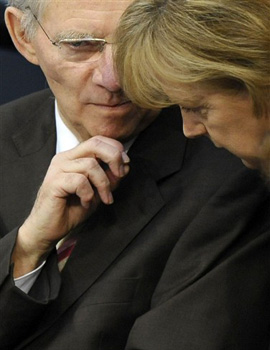The eurozone’s defining moment
Greek debt crisis highlights the eurozone’s mismanagement over many years, says analyst.

 |
| Greek debt crisis highlights how poorly prepared the euro zone is to handle such a situation [AFP] |
When a genie escapes from a bottle it is hard to persuade it back in again. Doubts over the future of the euro will be equally hard to bring back into control.
Even if the sizeable measures taken over the weekend at the emergency session in Brussels have stemmed the immediate rout in the market and conditions improve, this is not yet proof that the eurozone will really get to grips with its fundamental problems.
Keep reading
list of 4 itemsBoeing hit with 32 whistleblower claims, as dead worker’s case reviewed
US imposes new sanctions on Iran after attack on Israel
A flash flood and a quiet sale highlight India’s Sikkim’s hydro problems
And it will take some years for the eurozone to rebuild its reputation and re-establish confidence in its future.
Mismanagement is at the heart of the crisis.
Deteriorating confidence
There have long been suspicions that the eurozone was at risk from fault lines and lacked the means to control the fundamentals that would ultimately dictate the future of the currency union – thus many long-standing critics see the current situation as validating scepticism.
In fact, the debacle over the Greek debt crisis has flushed out more than the traditional critics – even many previous supporters of the euro have been dismayed and remain concerned about where this crisis might lead.
Confidence has deteriorated dramatically but this is hardly surprising given the delays and haggling over the aid to be offered to Greece and the unresolved question of how Greece will be expected to cope with its even more inflated public sector debt (possibly 150 per cent of GDP) at the end of the proposed three year $146bn aid package.
Financial markets worked out the arithmetic after last week’s deal and it appeared to point to inevitable restructuring.
Mismanagement
The Greek debt crisis is bad enough on its own – with as much as $300bn in external debt at risk – and the repercussions for other weak, high debt member states may well add to the eurozone’s burden.
 |
| The Greek government’s revised figures showed an even greater fiscal deficit [GETTY] |
But, even more importantly, this crisis has served to highlight just how poor the eurozone’s governance has been over many years and how poorly prepared and equipped it has been to deal with any crisis.
Since Greece joined the eurozone a decade ago, the government has kept economic growth running at a faster rate than in previous years but the cost has been a steadily increasing level of public sector debt and foreign borrowing.
By 2009, such debt was well over 100 per cent of GDP and foreign investors had started to demand a higher risk premium.
In early 2010, investors were further distressed at the new government’s release of revised figures showing an even greater fiscal deficit for 2009.
It looked increasingly unlikely that the government would be able to gain backing for a tough and credible plan to reduce the deficit, control debt and continue to finance its funding requirements through the markets – Greece has little experience of managing such a programme and the public’s ability to tolerate any austerity measures was low.
Market support might have been improved if unequivocal backing from the eurozone had been forthcoming at the beginning of the crisis.
Alternatively a rapid deal with the International Monetary Fund (IMF) to secure funding for 2010 might have contained the scale of the package and steadied market nerves.
But neither materialised and the crisis dragged on from the new year to late April before it exploded into a near default.
Late help meant that the cost has risen and the reputational damage has spread.
Spiral of fear
This was the crisis that was never supposed to happen. According to the Maastricht rules, such fiscal laxity should never have occurred – but it has.
| in depth | |||||||||||||||||||||||||||||
|
This has exposed the lack of any plan to cope with such an eventuality.
When swift policy was most needed, the main protagonists were still trying to formulate how any policy response would work and if it was constitutional.
And engaging in a eurozone bailout has raised the spectre of contagion to the benchmark German bund market.
The crisis could not have come at a worse time as all of Europe is struggling to rein in public debt.
The only beneficial factor from this crisis has been the weakening euro – a timely boost for Europe’s exports.
Ironically, as long as the global economy continues to recover strongly Germany may stand to gain as much from the added rise in exports (due to the drop in the euro) as it will pay out in assistance to Greece.
However, while this potential benefit from a falling euro could mollify German tax payers, market panic is not welcome and turbulence in the euro and bond markets could cause more damage to confidence and demand in the economy.
Talk of the euro heading back to parity against the dollar must be taken seriously.
Yet weaker economic growth prospects only add fuel to the spiral of fear as this makes fiscal policy tightening even harder to manage successfully.
The cost of failure could be punitive.
Euro-lite?
There is a very real risk of Greece having to restructure debt at the end of the three year aid package: the supportable level of debt is probably about 80 to 100 per cent of GDP at most – implying that as much as one third of Greek debt may have to be written off.
 |
| A drop in the euro may offer benefits for Germany [AFP] |
Unsurprisingly, this adds up to about the same sum as the proposed aid package -around $146bn by 2012.
And even with generous debt restructuring, Greece may still find it tough to keep the fiscal deficit down and to avoid rebuilding another debt problem.
Some see Greece exiting the euro – setting up a new drachma and letting this devalue against the euro to boost competitiveness. But this poses two problems.
Firstly, Greece performed poorly prior to euro zone entry – devaluations did not resolve its economic problems before and may not now.
Structural and governance issues must be tackled.
Secondly, it is hard for weak countries to leave the shelter of the euro as this may send interest rates soaring and create an even deeper, longer recession.
This might correct the external deficit and reduce external borrowing but the turbulence in the economy would be harsh – a typical emerging market crisis.
In fact it is easier for strong economies to leave the union than weak members.
This suggests that one option for the eurozone that must be taken seriously is that it could break apart into a “strong euro” group of economies and a “euro-lite” area (club med?) that could devalue its “euroette” to improve competitiveness and economic adjustment.
Most certainly it is time for some serious rethinking of the eurozone – the next few years will be make or break time.
Either the rules have to be realistic and enforced or new ideas for the way forward will have to be considered.
The eurozone governments might not like financial markets but they cannot ignore them and their prognoses – and it is the member states governments not the markets that have brought the euro to this critical position.
Vanessa Rossi is a senior research fellow at Chatham House’s International Economics Programme.
The views expressed in this article are the author’s own and do not necessarily reflect Al Jazeera’s editorial policy.
